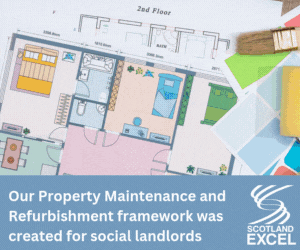Building Briefs – January 30th
- Guidance issued to strengthen fire safety in specialised housing
New guidance has been published to reduce the risk from fire in specialised housing, such as sheltered and supported accommodation.

Practical Fire Safety Guidance for Specialised Housing and Similar Premises aims to help those responsible for the housing and those who provide care and support services in such properties to carry out fire safety risk assessments, taking into account the requirements of individual residents.
Older people and people with physical, sensory or mental health issues are at increased risk of injury or death from fires.
The guidance is a recommendation of the Review of the Fire Safety Regime in Scotland, following the fire at Grenfell Tower in 2017.
- Edinburgh Napier expands Graduate Apprenticeship programme
Edinburgh Napier University has strengthened its Graduate Apprenticeship programme with the announcement of nearly 200 new opportunities for people to study for an honours degree while in employment.

A cohort of Graduate Apprenticeships on their induction day at Edinburgh Napier’s Craiglockhart campus last year
The University currently has 273 Graduate Apprentices actively studying across three cohorts. The first cohort joined Edinburgh Napier in September 2017.
The current batch of Graduate Apprentices will soon be joined by a fourth cohort, with the University announcing it has 185 new positions across a range of subjects within its School of Computing, Business School and School of Engineering and the Built Environment.
The courses available are: BA (Hons) Business Management, BEng (Hons) Civil Engineering, BSc (Hons) Construction & the Built Environment, BEng (Hons) Engineering: Design and Manufacture, BEng (Hons) Cybersecurity, BSc (Hons) Data Science, BSc (Hons) IT Management for Business and BSc (Hons) Software Development.
Each programme has been assigned 20 new places, other than the BSc (Hons) Construction & the Built Environment programme, which offers 45 places across four different learning pathways: Building Surveying, Quantity Surveying, Real Estate Surveying and Architectural Technology.
Graduate Apprenticeships have been developed by Skills Development Scotland in partnership with industry and the further and higher education sectors.
- Home Fix Scotland provides Inverclyde Shed with foundations for a better future
River Clyde Homes Group’s building, repairs and maintenance contractor Home Fix Scotland has donated materials and tools to Inverclyde Community Shed, an organisation aimed at combating loneliness and isolation in the region.

Bruce Newlands, Laughlan Smith and George Banks from Inverclyde’s Community Shed met with John Williams, senior contract manager from Home Fix Scotland, last Thursday.
The trio were given a tour of the premises including the workshops and storeroom at Springkell Street, Greenock before being presented with materials and serviceable power tools.
In addition to providing them with these resources, Home Fix Scotland has also allowed the group access to their waste materials as it strives to achieve its target of zero landfill waste by 2021.
Inverclyde’s Shed plan on using these tools to build and repair bird boxes, feeders, planters, and garden furniture.
The Inverclyde Shed is open to men or women over 18 and membership costs £10 a year plus a £1 donation every visit which covers unlimited cups of tea/coffee and some biscuits/cake. It also helps to cover the basic running costs of the shed on a day to day basis.
- Pacific begins work on new project at Edinburgh International Airport
Pacific Building has begun work on delivering another All Bar One at Edinburgh International Airport.

It will be the second at the airport – and both will stand as valuable and stylish additions to the airside eating and drinking experience for travellers passing through Scotland’s busiest airport.
A £1.5 million budget will see Pacific spend 13 weeks comprehensively fitting out a unit that has stood empty for a considerable period of time.
The 4,000 sq ft site is next to Brew Dog – which was also delivered by Pacific – and will boast the customary high-end fixtures and finishes that are associated with the brand.
- £500k Banchory Museum and Library revamp planned for summer 2020
Aberdeenshire Council is due to transform the existing library and museum in Banchory into a culture and visitor centre with a £500,000 investment.
The majority of the costs are being funded through the Scottish Government’s Town Centre Fund, with the building work due to go ahead during this summer.
Key aspects of the new facility will be vastly improved access between the two floors through the installation of a lift, together with a redesign of the building to allow it to deliver a far wider range of cultural services on both floors.
The existing library and museum will deliver an enhanced service on site, with the building expected to showcase a wider selection of local artefacts on a permanent basis.
Staff will be holding a drop-in engagement event on Tuesday, February 11, from 2.30pm-6.30pm in the library and museum, when the plans will be unveiled. All members of the public are invited to share their thoughts on the resources they would like to see in the upgraded building.
- Construction begins on new active travel routes to Kirkcaldy hospital
Work has started on the first phase of new ‘active travel’ routes to Victoria Hospital in Kirkcaldy.
The route will connect from the toucan crossing at the White Heather Roadhouse on Hendry Road through to the Whyteman’s Brae junction and on to Beatty Crescent, along Hayfield Road.
The shared use paths will replace the on-road cycle lanes on Hayfield Road and will be more suitable for not only bicycles but, mobility scooters and pedestrians.
A second phase, planned for later in the year, if funding is secured, will connect the route up to Overton Road, Cumbrae Terrace and Chapel Level.
The first phase of work is expected to take around eight weeks.
- Aggregate Industries launches 2020 Apprentice Programme
Ahead of this year’s National Apprenticeship Week (3-7 February), Aggregate Industries is committing to investing further in the next generation by launching its 2020 Apprenticeship Programme.
The Programme has been specifically designed to offer people the chance to earn while they learn. Successful candidates are given the opportunity to gain on-the-job experience, whilst achieving professional qualifications – helping them to lay a solid foundation for a career in construction.
Each year, the Aggregate Industries offers tailored placements for the apprentices across a variety of business divisions. This includes working at some of the UK’s largest quarries, state-of-the-art asphalt plants and on some of the country’s biggest road improvement schemes - as well as areas such as finance and HR.
This year’s programme will include nearly 30 nationwide positions, comprising various level two, three and four apprenticeship roles in areas such as business admin, mobile and static plant, minerals management, electrical and mechanical engineering, plant operations and sales. With the programme now in its fifteenth year, Aggregate Industries has successfully trained more than 300 graduates and apprentices in a number of these roles to date.
- FORS join Mates in Mind to transform mental health across UK workplaces
This month, the Fleet Operator Recognition Scheme (FORS) joined Mates in Mind’s community of supporter organisations and have partnered with the charity to improve the mental health of their workforce and members.
The partnership has arisen as Mates in Mind, initially established to tackle the challenges of mental ill-health specifically within the construction sector, has expanded the support and services it offers within the supply-chain, to incorporate transport and logistics companies, including fleet operators of all sizes.
FORS is a well-established voluntary accreditation scheme dedicated to raising standards across the road transport industry, encompassing all aspects of safety, efficiency, and environmental protection.
Now in its 12th year, FORS has 5,000 members nationwide and provides evolving best practice for transport operators of any size and vehicle make-up, including HGVs, vans, passenger-carrying vehicles, powered two-wheelers and passenger cars.
- Saint-Gobain UK and Ireland named a Top Employer 2020
Saint-Gobain UK & Ireland has been certified as a Top Employer in the United Kingdom for the eighth consecutive year, and in Ireland for a fifth consecutive year.
The accolade, awarded annually by the Top Employers Institute, globally certifies excellence in the conditions that employers create for their people and the highest standards in human resources.
Learning and development opportunities, career and succession, working conditions and the overall culture of the organisation are all independently audited during the annual process.
Saint-Gobain has also been named a Global Top Employer for the fifth consecutive year. This recognises the exceptional employee offerings the organisation provides in its companies across the world. Saint-Gobain is one of only 13 companies to receive this badge worldwide.
The Top Employers Institute, an independent organisation, awards the Global Top Employer label to companies that it has certified in at least 20 countries and on several continents.
- Consultation on Glasgow student accommodation to be launched
An eight-week consultation on the revision of student accommodation will be launched across Glasgow.
The document featuring the revised supplementary guidance on student accommodation was presented to Glasgow City Council’s neighbourhoods committee this week.
The aim is to create better quality accommodation an improve integration between new facilities and existing communities.
The 2011 Census confirmed that there were almost 130,000 students studying in Glasgow with nearly half of these students living in the city’s boundary.
Traditionally, students have lived in halls of residence, at home, in Houses in Multiple Occupancy (HMO) or private rented accommodation.
But over the past 10 years, purpose-built student accommodation (PBSA) has become an increasingly popular development model which primarily attracts post-graduate and international students.
Areas of concentration where there are high volumes of student accommodation include South Partick/Yorkhill, the area surrounding Glasgow University and Townhead, a neighbourhood east of Glasgow Caledonian University and North of Strathclyde.
The local authority believes that further development of PBSA would likely undermine residential amenity in these areas and will therefore resist any further applications for developments of this nature in these areas.
- Aberdeen City Council taking part in national roads training scheme
Aberdeen City Council roads managers have taken part in the launch of a roads training scheme for Scotland.
The Scottish Roads Training Programme is designed to benefit roads authorities across the country by co-ordinating road worker training with the ambition of re-engineering how road operatives are qualified and how training programmes are procured.
The system will use intelligent management systems to simplify and improve the efficiency of the delivery of local training and also develop relevant Scottish qualifications.
Councils will be able to use the programme as a single booking system for all training providers whether through an external procurement route or in-house, and this means roads authorities can collaborate on joint external procurement or share resources for in-house training to maximise efficiency.
Aberdeen is one of about 20 roads authorities in Scotland which have indicated they are signing up to the scheme.
The Scottish Roads Training Programme will also include a dedicated national resource, training co-ordinated through a booking system, measurable efficiencies by reducing training costs, improved certainty of future training budget requirements, improved forward planning of training needs, consistent core training for road workers, and a training card for road workers.













